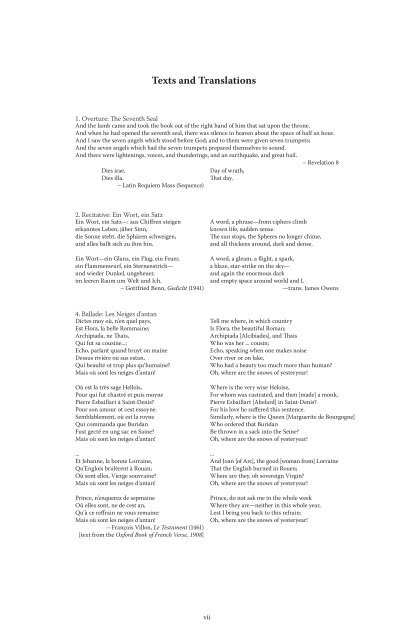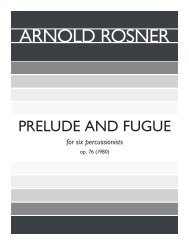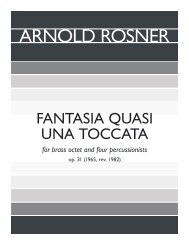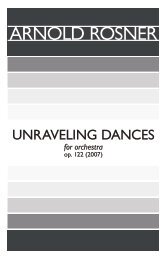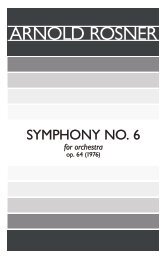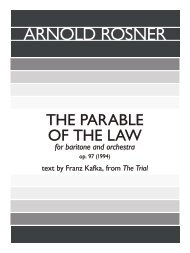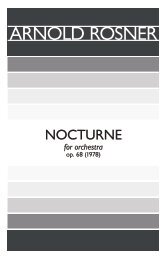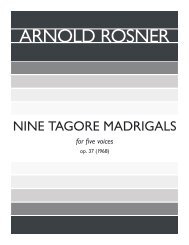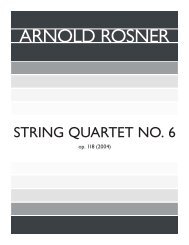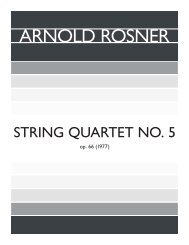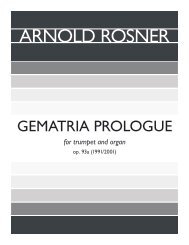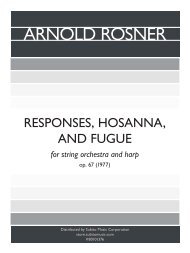Create successful ePaper yourself
Turn your PDF publications into a flip-book with our unique Google optimized e-Paper software.
Texts and Translations<br />
1. Overture: The Seventh Seal<br />
And the lamb came and took the book out of the right hand of him that sat upon the throne.<br />
And when he had <strong>op</strong>ened the seventh seal, there was silence in heaven about the space of half an hour.<br />
And I saw the seven angels which stood before God; and to them were given seven trumpets;<br />
And the seven angels which had the seven trumpets prepared themselves to sound.<br />
And there were lightenings, voices, and thunderings, and an earthquake, and great hail.<br />
– Revelation 8<br />
Dies irae,<br />
Dies illa.<br />
– Latin <strong>Requiem</strong> Mass (Sequence)<br />
Day of wrath,<br />
That day.<br />
2. Recitative: Ein Wort, ein Satz<br />
Ein Wort, ein Satz—: aus Chiffren steigen<br />
erkanntes Leben, jäher Sinn,<br />
die Sonne steht, die Sphären schweigen,<br />
und alles ballt sich zu ihm hin.<br />
Ein Wort—ein Glanz, ein Flug, ein Feuer,<br />
ein Flammenwurf, ein Sternenstrich—<br />
und wieder Dunkel, ungeheuer,<br />
im leeren Raum um Welt und Ich.<br />
– Gottfried Benn, Gedicht (1941)<br />
A word, a phrase—from ciphers climb<br />
known life, sudden sense.<br />
The sun st<strong>op</strong>s, the Spheres no longer chime,<br />
and all thickens around, dark and dense.<br />
A word, a gleam, a flight, a spark,<br />
a blaze, star-strike on the sky—<br />
and again the enormous dark<br />
and empty space around world and I.<br />
<br />
—trans. James Owens<br />
4. Ballade: Les Neiges d’antan<br />
Dictes moy où, n’en quel pays,<br />
Est Flora, la belle Rommaine;<br />
Archipiada, ne Thaïs,<br />
Qui fut sa cousine...;<br />
Echo, parlant quand bruyt on maine<br />
Dessus rivière ou sus estan,<br />
Qui beaulté ot tr<strong>op</strong> plus qu’humaine?<br />
Mais où sont les neiges d’antan!<br />
Où est la très sage Helloïs,<br />
Pour qui fut chastré et puis moyne<br />
Pierre Esbaillart à Saint-Denis?<br />
Pour son amour ot cest essoyne.<br />
Semblablement, où est la royne<br />
Qui commanda que Buridan<br />
Fust gecté en ung sac en Saine?<br />
Mais où sont les neiges d’antan!<br />
...<br />
Et Jehanne, la bonne Lorraine,<br />
Qu’Englois brulèrent à Rouan;<br />
Où sont elles, Vierge souvraine?<br />
Mais où sont les neiges d’antan!<br />
Prince, n’enquerez de sepmaine<br />
Où elles sont, ne de cest an,<br />
Qu’à ce reffrain ne vous remaine:<br />
Mais où sont les neiges d’antan!<br />
– François Villon, Le Testament (1461)<br />
[text from the Oxford Book of French Verse, 1908]<br />
Tell me where, in which country<br />
Is Flora, the beautiful Roman;<br />
Archipiada [Alcibiades], and Thais<br />
Who was her ... cousin;<br />
Echo, speaking when one makes noise<br />
Over river or on lake,<br />
Who had a beauty too much more than human?<br />
Oh, where are the snows of yesteryear!<br />
Where is the very wise Heloise,<br />
For whom was castrated, and then [made] a monk,<br />
Pierre Esbaillart [Abelard] in Saint-Denis?<br />
For his love he suffered this sentence.<br />
Similarly, where is the Queen [Marguerite de Bourgogne]<br />
Who ordered that Buridan<br />
Be thrown in a sack into the Seine?<br />
Oh, where are the snows of yesteryear!<br />
...<br />
And Joan [of Arc], the good [woman from] Lorraine<br />
That the English burned in Rouen;<br />
Where are they, oh sovereign Virgin?<br />
Oh, where are the snows of yesteryear!<br />
Prince, do not ask me in the whole week<br />
Where they are—neither in this whole year,<br />
Lest I bring you back to this refrain:<br />
Oh, where are the snows of yesteryear!<br />
vii


